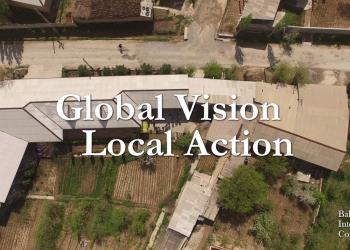BIC hosts Dialogue Series: Global Vision, Local Action
The Baha’i International Community hosted a series of five online side events during the United Nations’ High-level Political Forum held from 7-16 July 2020. Focusing on the theme of bolstering local action—a topic under consideration during the forum—the BIC-hosted events involved the screening of the film ‘Global Vision, Local Action’ followed by remarks from individuals with experience working at the grassroots preceding an open dialogue to explore the topic. The eight minute film touches on the efforts of Baha’i communities around the world learning how to translate global processes into local action. Cumulatively, the events welcomed 70 individuals from across the globe.
Ban Ki-moon, former UN Secretary General, stated in relation to the 2030 Agenda for Sustainable Development, “If we are to succeed, the new agenda cannot remain the exclusive domain of institutions and governments. It must be embraced by people.” Building on this theme, the discussions aimed to unpack the relationship between the local and the global and were driven by questions such as: what is the importance of localizing global plans and how have they inspired action at the local level; what elements assist a community to take ownership of its own path of development; how can insights generated from the participation of local actors in global initiatives be shared at a global level; and how do local efforts become interconnected globally.
“With the pandemic, more than any time in our history, we are realizing how connected we are,” one panelist shared in contextualizing the need for a shared global framework. “While we have distinct local and national identities, our continued existence requires us to think and act collectively. Solutions and challenges are collective. So there is a need for global institutions to give direction and consensus to coordinate our response to common challenges.”
Throughout the discussions, participants explored the value of a global vision to guide local efforts: “There is a common vision of what development should be. However, each local community has its own context, realities, and it has its own learning of how these goals can be accomplished,” shared one participant. Moreover, as another participant described, “local communities know their communities better, and there is an element of trust.”
The evolving nature of the relationship between the global and local was also explored throughout the series: “There is this iterative and dialogical process, each is feeding each with knowledge. The positioning is not one of superiority or status…. The local has the unique opportunity of putting into practice in the field, and the global brings these insights together,” one contributor shared.
“There is an interplay between tapping into a global body of knowledge and generating insights at a local level which can also impact what is happening globally,” another panelist described. “Being connected to a global system of learning gives value to small efforts.”
The importance of knowledge generated at the local level was also highlighted: “We have been learning about a conversation where all can see themselves as local protagonists. If we are not all learning, then we are all victims of the outcome, we all lose out.” Another participant expanded on this point: “those that are most impacted by a particular goal, those that are living the experience are really the experts. We have to ensure that the steps we take are drawing on real experience.”
The vital role of youth as powerful grassroots actors characterized a large portion of the discussions. In reflecting on the experiences of Baha’i communities worldwide working with groups of young people between the ages of 12 and 15, one participant shared, “these groups exist all around the world, though they differ in how they are carried out based on the local circumstances.” It was mentioned that through this global educational process, young people are assisted in developing intellectual and spiritual capacities to become local protagonists for positive community change. “Youth learn to express thoughts, engage in conversations about community issues, brainstorm solutions, build leadership, and take ownership”.
Describing how these efforts are connected to a global process of learning, one contributor explained, “young people in local settings are being supported to write their own narrative,” as they gain insights from the experiences that are shared at the global level, analyze them, and learn different ways to apply them to their specific reality.
“It might seem simple,” shared one participant, “but just thinking about youth and how they execute their plans shows how local community members can think about the wellbeing of their community and actualize a plan … working with this foundational framework that humanity is one and creating solutions that would benefit the whole.”
Daniel Perell, a Representative of the BIC to the United Nations, shared that “the goal of the BIC in hosting this series was to use a compelling film to contribute two main lines of thought. The first is the importance of local actors driving a process that is connected to a globally shared endeavor, reflective of our inherent interdependence. And the second, and perhaps more vital, is the posture of learning which must be adopted by both the local and global communities as we continue to understand and refine what true progress looks like.”
